Related Research Articles
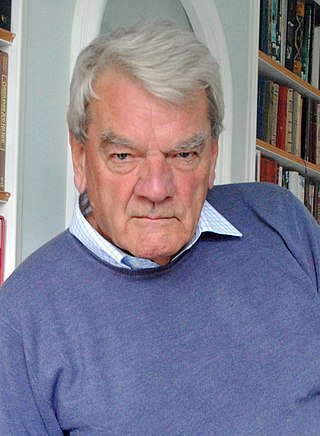
David John Cawdell Irving is an English author who has written on the military and political history of World War II, especially Nazi Germany. He was found to be a Holocaust denier in a UK court in 2000 as a result of a failed libel case.
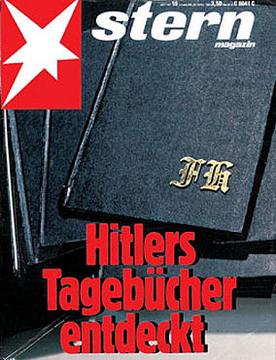
The Hitler Diaries were a series of sixty volumes of journals purportedly written by Adolf Hitler, but forged by Konrad Kujau between 1981 and 1983. The diaries were purchased in 1983 for 9.3 million Deutsche Marks by the West German news magazine Stern, which sold serialisation rights to several news organisations. One of the publications involved was The Sunday Times, who asked their independent director, the historian Hugh Trevor-Roper, to authenticate the diaries; he did so, pronouncing them genuine. At the press conference to announce the publication, Trevor-Roper announced that on reflection he had changed his mind, and other historians also raised questions concerning their validity. Rigorous forensic analysis, which had not been performed previously, quickly confirmed that the diaries were fakes.

Otto Heinrich Frank was the father of Anne Frank. He edited and published the first edition of her diary in 1947 and advised on its later theatrical and cinematic adaptations. In the 1950s and the 1960s, he established European charities in his daughter's name and founded the trust which preserved his family's wartime hiding place, the Anne Frank House, in Amsterdam.
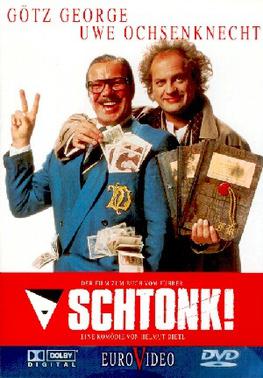
Schtonk! is a 1992 German satirical film which retells the story of the 1983 Hitler Diaries hoax. It was written and directed by Helmut Dietl.
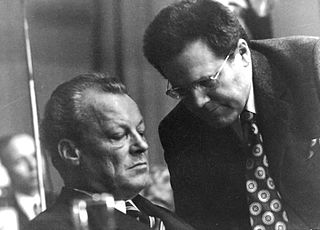
Günter Guillaume was an East German spy who gathered intelligence as an agent for East Germany's secret service, the Stasi, in West Germany. Guillaume became West German chancellor Willy Brandt's secretary, and his discovery as a spy in 1973 led to Brandt's downfall in the Guillaume affair.

Konrad Paul Kujau was a German illustrator and forger. He became famous in 1983 as the creator of the so-called Hitler Diaries, for which he received DM 2.5 million from a journalist, Gerd Heidemann, who in turn sold it for DM 9.3 million to the magazine Stern, resulting in a net profit of DM 6.8 million for Heidemann. The forgery resulted in a four-and-half-year prison sentence for Kujau.
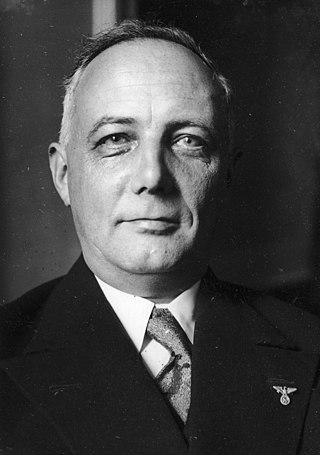
Hermann Adolf Reinhold Rauschning was a German politician and author, adherent of the Conservative Revolution movement who briefly joined the Nazi movement before breaking with it. He was the President of the Senate of the Free City of Danzig from 1933 to 1934. In 1934, he renounced Nazi Party membership and in 1936 emigrated from Germany. He eventually settled in the United States and began openly denouncing Nazism. Rauschning is chiefly known for his book Gespräche mit Hitler in which he claimed to have had many meetings and conversations with Adolf Hitler.

Karl Friedrich Otto Wolff was a German SS functionary who served as Chief of Personal Staff Reichsführer-SS and an SS liaison to Adolf Hitler during World War II. He ended the war as the Supreme SS and Police Leader in occupied Italy and helped arrange for the early surrender of Axis forces in that theatre, effectively ending the war there several days sooner than in the rest of Europe. He escaped prosecution at the Nuremberg Trials as a result of his participation in Operation Sunrise. In 1962, Wolff was re-arrested and prosecuted in West Germany for the deportation of Polish Jews, and he was sentenced to 15 years in prison for being an accessory to murder in 1964. He was released in 1971 due to his failing health, but died 13 years later.

Johanna Maria Magdalena "Magda" Goebbels was the wife of Nazi Germany's Propaganda Minister Joseph Goebbels. A prominent member of the Nazi Party, she was a close ally, companion, and political supporter of Adolf Hitler. Some historians refer to her as the unofficial "first lady" of Nazi Germany, while others give that title to Emmy Göring.

Adolf Hitler, chancellor and dictator of Nazi Germany from 1933 to 1945, committed suicide via a gunshot to the head on 30 April 1945 in the Führerbunker in Berlin after it became clear that Germany would lose the Battle of Berlin, which led to the end of World War II in Europe. Eva Braun, his wife of one day, also committed suicide by cyanide poisoning. In accordance with Hitler's prior written and verbal instructions, that afternoon their remains were carried up the stairs and through the bunker's emergency exit to the Reich Chancellery garden, where they were doused in petrol and burned. The news of Hitler's death was announced on German radio the next day, 1 May.

Stern is an illustrated, broadly left-liberal, weekly current affairs magazine published in Hamburg, Germany, by Gruner + Jahr, a subsidiary of Bertelsmann. Under the editorship (1948–1980) of its founder Henri Nannen, it attained a circulation of between 1.5 and 1.8 million, the largest in Europe's for a magazine of its kind.

Blondi was Adolf Hitler's German Shepherd, a gift as a puppy from Martin Bormann in 1941. Hitler kept Blondi even after his move into the Führerbunker located underneath the garden of the Reich Chancellery on 16 January 1945.

The Night of the Generals is a 1967 World War II mystery film directed by Anatole Litvak and produced by Sam Spiegel. It stars Peter O'Toole, Omar Sharif, Tom Courtenay, Donald Pleasence, Joanna Pettet, and Philippe Noiret. The screenplay by Joseph Kessel and Paul Dehn was loosely based on the beginning of the 1962 novel of the same name by German author Hans Hellmut Kirst. The writing credits also state the film is "based on an incident written by James Hadley Chase", referring to a subplot from Chase's 1952 novel The Wary Transgressor. Gore Vidal is said to have contributed to the screenplay, but was not credited onscreen. The film's musical score was composed by Maurice Jarre.

Hans von Dohnanyi was a German jurist. He used his position in the Abwehr to help Jews escape Germany, worked with German resistance against the Nazi régime, and after the failed 20 July Plot, he was accused of being the "spiritual leader" of the conspiracy to assassinate Hitler, and executed by the SS in 1945.

Literary forgery is writing, such as a manuscript or a literary work, which is either deliberately misattributed to a historical or invented author, or is a purported memoir or other presumably nonfictional writing deceptively presented as true when, in fact, it presents untrue or imaginary information or content.
Walter Wagner was the notary who married Adolf Hitler to Eva Braun in the Führerbunker on 29 April 1945.
The Hitler family comprises the relatives and ancestors of Adolf Hitler, an Austrian-born German politician and the leader of the Nazi Party, who was the dictator of Germany, holding the title Chancellor of Germany from 1933 to 1945, and head of state as Führer und Reichskanzler from 1934 to 1945. Adolf Hitler had a central role in the rise of Nazism in Germany, provoking the start of World War II, and holding ultimate responsibility for the deaths of many millions of people during the Holocaust.

Edda Carin Wilhelmine Göring was the only child of German politician, military leader, and leading member of the Nazi Party Hermann Göring, by his second marriage to the German actress Emmy Sonnemann.

Selling Hitler is a 1991 ITV television comedy-drama mini-series about the Hitler Diaries hoax and was based on Robert Harris's 1986 book Selling Hitler: The Story of the Hitler Diaries.
Faking Hitler is a German television miniseries that was released on RTL+ on 30 November 2021. It is a partial dramatization of the events surrounding the publication of the forged Hitler Diaries in the early 1980s. The title Faking Hitler was interpreted as an allusion to the book Selling Hitler: The Story of the Hitler Diaries (1986) by Robert Harris and the 1991 series of the same name.
References
- ↑ Jefferson Adams. Historical Dictionary of German Intelligence (2009), p. 193
- 1 2 Harris, Robert (1991) [1986]. Selling Hitler: The Story of the Hitler Diaries. London: Faber. pp. 159–61. ISBN 9780571147267.
- ↑ Roy Pateman. The Man Nobody Knows: The Life and Legacy of B. Traven (2005), p. 12
- ↑ Wyden, Peter (2001). The Hitler Virus: The Insidious Legacy of Adolf Hitler. Arcade. p. 173. ISBN 9781559705325.
- ↑ "Stern Fires Hitler 'Diary' Reporter". washingtonpost.com. Retrieved 28 April 2024.
- ↑ "BBC ON THIS DAY | 25 | 1983: 'Hitler diaries' published". BBC News. 25 April 1983. Retrieved 20 February 2016.
- ↑ "3 Found Guilty in Sale of Fake 'Hitler Diaries'". latimes.com. Retrieved 28 April 2024.
- ↑ "Was Hitler diary a plot?". The Week. 8 January 2015. Retrieved 16 September 2021.
- ↑ The Reunion, BBC Radio, 7 September 2008
- ↑ Hall, Allan (24 April 2008). "Living in poverty, the man who 'found' Hitler's diaries". The Independent . Retrieved 20 February 2016.
- ↑ "'Hitler Diaries' Discoverer Living on Welfare". spiegel.de. Retrieved 28 April 2024.
- ↑ "'Hitler Diaries' Reporter Wants Them Back". spiegel.de. Retrieved 28 April 2024.